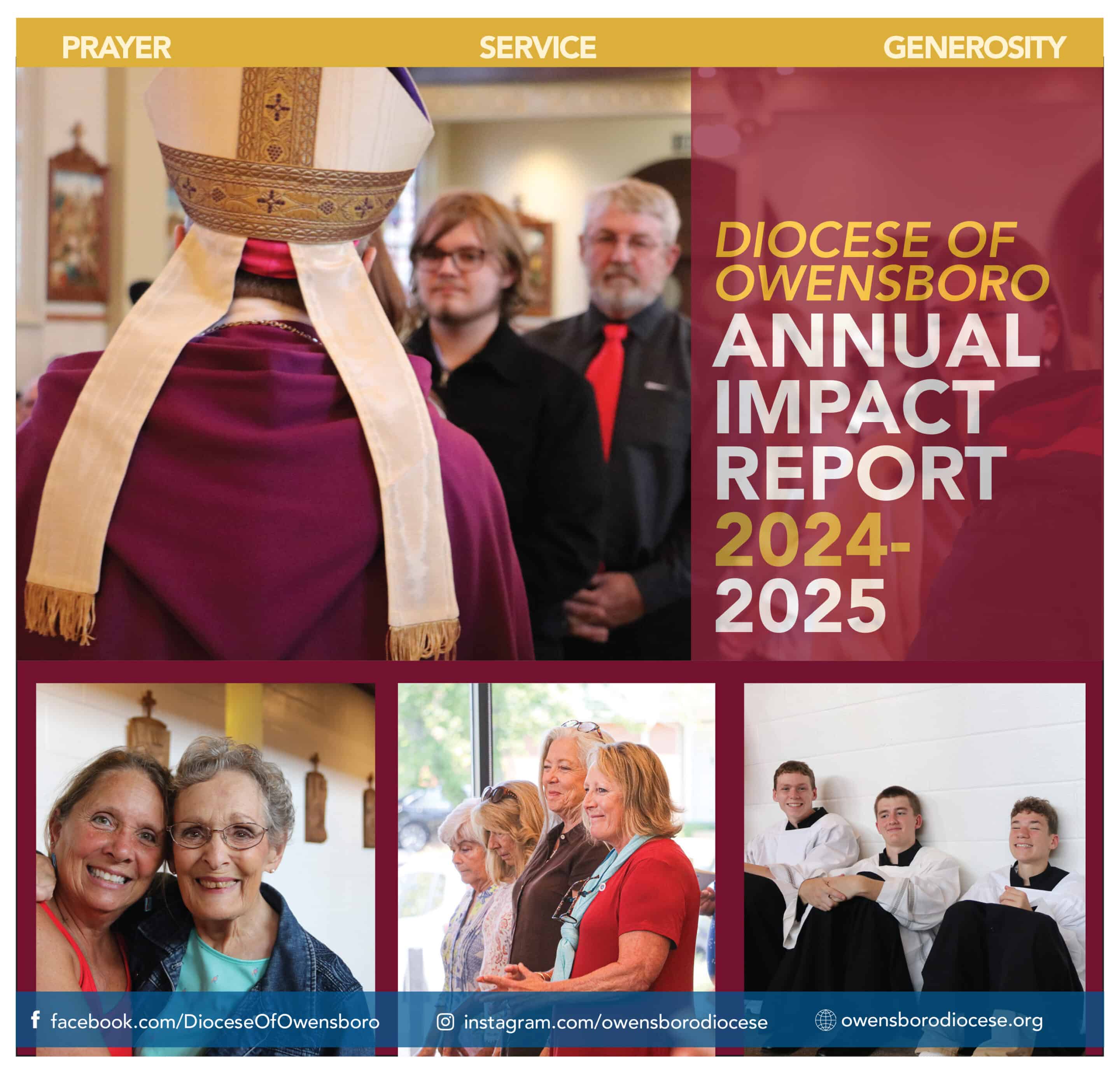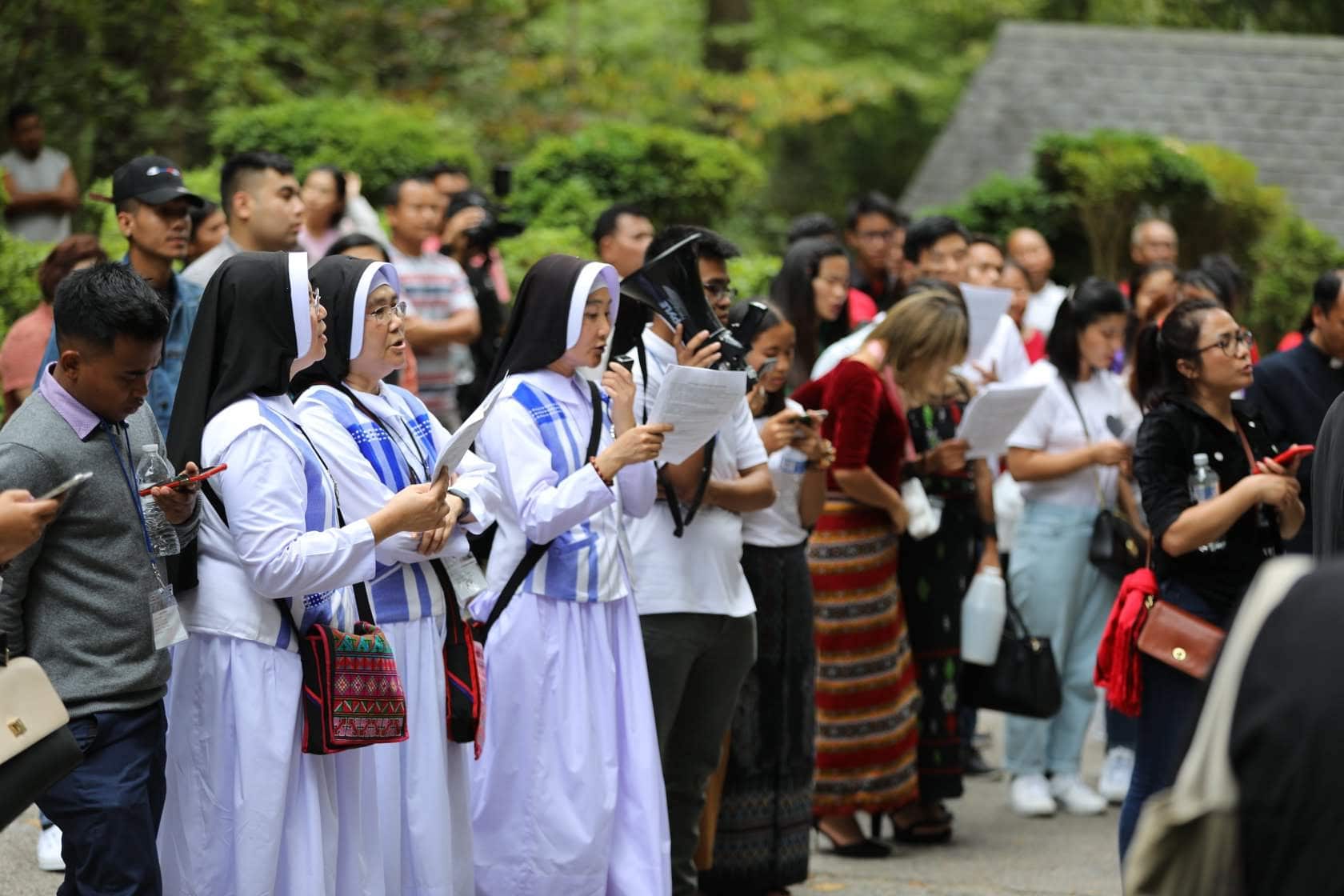
Women religious, attending the 2019 National Conference of Burmese-American Catholics, pray the Stations of the Cross while visiting the National Shrine of Our Lady of Lourdes in Emmitsburg, Md. COURTESY OF NCBAC
For 20-plus years, mission of NCBAC serves needs of Catholic refugees from Myanmar
BY ELIZABETH WONG BARNSTEAD, THE WESTERN KENTUCKY CATHOLIC
Because of his home country’s troubled political situation and religious restrictions, Maurice Lee had no access to high quality Catholic books when he was growing up in Myanmar (also known as Burma).
This meant he did not understand the details of his Catholic faith – a common issue among Catholics in Myanmar, many of whom have left Catholicism to form their own Protestant denominations.
“In 2000, when I came (to the U.S.), that’s where I found the treasure: apologetics books and conversion stories,” said Lee in a phone call from his home in Maryland. “And, I can read them online!”
Settling in the United States, however, Lee saw firsthand how Burmese Catholic refugees “are not well-equipped with the knowledge – we need to encourage ourselves and others to keep our Catholic traditions,” he said.
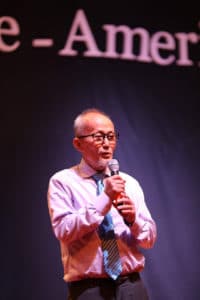
John Sailon speaks during the Sunday night session of the 2019 National Conference of Burmese-American Catholics, which was held in Harrisburg, Pa. COURTESY OF NCBAC
Fortunately, he came in contact with John Sailon, a Burmese Catholic living in Harrisburg, Pa.
Sailon was the point person and leader in the early years of Burmese Catholic ministry, helping refugees access both material and spiritual resources as they resettled in the U.S. He was also impactful in helping Lee connect with the wider Burmese Catholic community in this country.
Today, this ministry has grown into an organization called the National Conference of Burmese-American Catholics (NCBAC). Lee is the current president.
And from July 1-4, 2022, more than a thousand Burmese Catholics will gather in Owensboro, Ky., for the NCBAC’s first conference since the COVID-19 pandemic began. The conference will feature religious education/apologetics sessions, cultural dancers representing various Myanmar ethnicities and a soccer match.
The centerpiece of the conference will be the second U.S. priesthood ordination of a Myanmar-born priest, Dcn. Martin Ma Na Ling, on July 2 at 10 a.m.
“I can’t wait. I am so excited,” said Sailon, who today serves as the NCBAC’s assistant spiritual director.
Ethnic diversity
Myanmar has faced political turmoil for decades as different forces wrestle for control of the Southeast Asian country.
The humanitarian crisis that developed due to power struggles between military and democratic leaders – as well as the persecution of minority ethnic classes – has caused a mass exodus of Myanmar citizens to nearby countries like Malaysia and Thailand. The February 2021 military coup only worsened the situation.
Unfortunately, the infrastructure and political complexities of these countries can only provide uneasy security for Myanmar refugees, many of whom have lived in refugee camps for years.
This has led to a significant portion of the Myanmar diaspora to apply for refugee status with the United States, where they have been able to resettle.
According to an April 29, 2021 fact sheet from Pew Research Center, the population of people from Myanmar living in the U.S. numbered 189,000 in 2019.
Adding to the complexity of the situation is the fact that multiple ethnicities, who in turn speak different dialects, have resettled in the U.S. while being grouped into the broad category of “Burmese.”
Fr. Stephen Van Lal Than, the first Myanmar-born priest ordained in the U.S. who today serves as the parochial vicar of Holy Spirit Parish in Bowling Green, Ky., said the title “Burmese” is something of a misnomer.
“Collectively, it is ok, because we come from a country formerly known as Burma,” said Fr. Van Lal Than in a phone call with The Western Kentucky Catholic. Therefore, it is appropriate to refer to a group of people as “Burmese Catholics.”
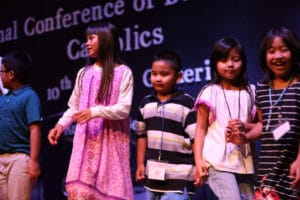
Children sing during the 2019 National Conference of Burmese-American Catholics, which was held in Harrisburg, Pa. COURTESY OF NCBAC
But when it comes to individuals, he said it is not technically correct to call a person Burmese who is not ethnically Burmese. They may in fact belong to a different tribe/ethnicity, such as the Karenni people, the Chin people, or the Karen people.
Fr. Van Lan Than said that others whose native land is Myanmar may even refer to themselves as Thai, after living for so long in refugee camps in Thailand (many children of Myanmar-born parents have been born in Thailand).
This is one of the reasons why it is crucial to have large events like the NCBAC conference, bringing all together into one communal celebration.
Lee said that the conference will provide the opportunity so that “not only we can upkeep our Catholic faith but also we can share our cultural heritage and keep our culture alive as well.”
A ministry grows
Lee said that back in the early 2000s, Sailon witnessed how Catholics arriving as refugees from their turmoil-stricken country “did not have a lot of help from the local (U.S. Catholic) community.”
Too often, these Catholic families would end up leaving the Catholic Church because local Christian denominations would offer better financial assistance and other resources.
Sailon started reaching out and helping these people, even opening his home as a “safe refuge for many families,” said Lee. “He felt there was a need for organization, for helping spiritually (and) financially.”
“There were not many Burmese Catholics in the area at the time but around 2005 there was an influx of Burmese refugees from Malaysia and Thailand to Baltimore, Maryland, and Harrisburg, Pennsylvania, primarily,” said Lee.
Because of Sailon’s efforts, the two communities from Maryland and Harrisburg soon became a small Burmese Catholic community celebrating religious occasions such as Christmas, Easter and the Assumption.
Sailon coordinated a small gathering during Christmastime 2001, bringing together a handful of Burmese Catholic families from the Baltimore, Md., and Harrisburg, Pa., areas.
The holiday celebration included Mass celebrated in Burmese by Fr. Donald Lasap, a priest who had been sent from Myanmar to minister to the growing population of Burmese Catholics.
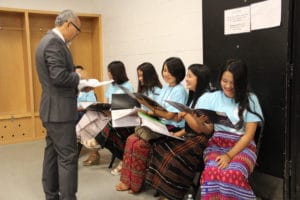
John Sailon practices music with members of the choir during the 2018 National Conference of Burmese-American Catholics, which was held in Battle Creek, Mich. COURTESY OF NCBAC
In 2007, Sailon got in contact with the U.S. Conference of Catholic Bishops’ Asian and Pacific Island Affairs subcommittee regarding his grassroots efforts.
He was invited to a conference in Arizona where he shared his vision to help Burmese Catholics in the United States – “and received strong support from the USCCB to continue his mission,” said Lee.
“When John returned from the meeting in Arizona with the USCCB, there were only 15-16 Burmese Catholic households between Maryland and Pennsylvania,” said Lee. He said Sailon had also started reaching out to Burmese Catholics in Michigan.
“In 2010 we had our first conference during Labor Day weekend in Harrisburg, Pennsylvania,” said Lee, adding that 350-400 participants were present that first year, and that the Harrisburg Burmese Catholics generously covered all the costs of the conference.
“That launched the NCBAC – that’s how the NCBAC was born,” said Lee.
Looking forward
Sailon spoke with The Western Kentucky Catholic in a phone call from his home in Pittsburgh, Pa., where he lives today with his family, including four grandchildren ages one through six.
He looks forward to traveling to Owensboro for the conference, where he will be one of the speakers at the apologetics sessions.
“I believe apologetics are part of the New Evangelization,” said Sailon. “Faith formation is very important.”
Sailon will also be conducting a Burmese choir at the conference – something he has traditionally done at every conference. He said in the early years, he would travel to different communities of Burmese Catholics and practice with them in-person during the year leading up to the conference.
Now, thanks to the evolution of modern technology, they can practice virtually.
“When I started building community, some (Burmese refugees) would come and stay in my home,” he said. “I would feed them, teach them to drive, and then they would move on and a new family would come.”
He said this is the key to evangelization and caring for people: “If you invite people and provide support, they will come.”
“Our duty is for our people not to lose our faith,” he said.
Learn more about the conference at https://www.ncbac.us/.

